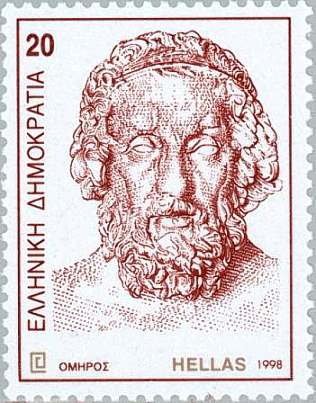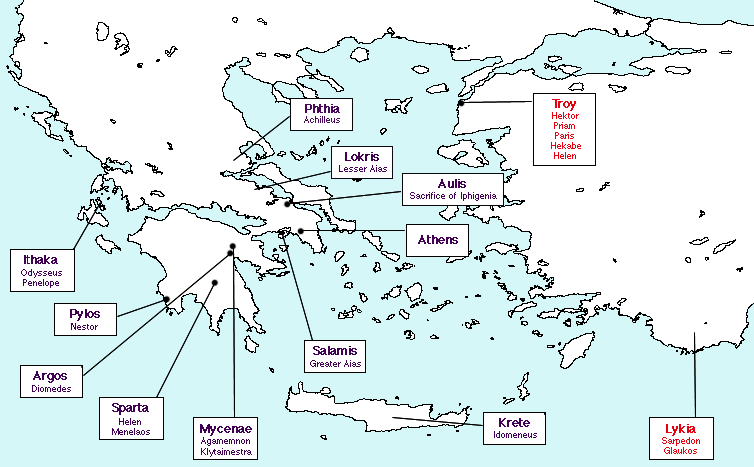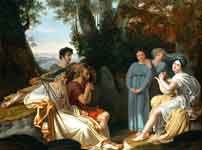|
|
“If we don’t preserve a world in which we can read Homer, then the world is not worth preserving” from a Lecture Homer the hypothetical author of Odyssey and Iliad, the number of works about him most of speculative character is inverse proportional to what we really know about him, not even the ancient Greeks knew much more. Maybe he was a revolutionary Aoidos who modified writings of the priests. For this reason maybe not respected much by Plato.
Greek Stamp of Homer 1998, (Stamp of was produced around 730 BC and the story of . A great many scholars, however, maintain their belief in the reality of an actual "Homer". So little is known or even guessed of his actual life, that scholars joke the poems "were not written by Homer, but by another man of the same name," and the classicist Richmond Lattimore, author of a good poetic translation to English of both epics, once called a paper Homer: Who Was She? Similarly, Robert Graves speculated on a female Homer. Samuel Butler was more specific, theorizing a young Sicilian woman as author of the Odyssey (but not the Iliad). Another question is: do the tales have a factual basis? The commentaries on the Iliad and the Odyssey written in the Hellenistic period (3rd to 1st century BC) began exploring the textual inconsistencies of the poems. The excavations of Heinrich Schliemann in the late 19th century began to convince scholars there was an historical basis for the Trojan War. Research (pioneered by the aforementioned Parry and Lord) into oral epics in Serbo-Croatian and Turkish languages began to convince scholars that long poems could be preserved with consistency by oral cultures until someone bothered to write them down.
Iliad and Troy relevant Map by Daphne Kleps. Troy or Ilios (derived probably from Wilusa) is considered to be a city known today as Troy VIIa destroyed by the Greeks in 1180 BC. The naval Greek force of 1186 ships started the expedition from Aulis. , from a German Journal of Classical Archaeology U. Quatember, Homer und Entenhausen. Zur Antikenrezeption in den Donald-Duck-Comics von Carl Barks, Forum Archaeologiae 17/XII/2000 (
QUOTES Among others who were brought to Alexandria by the fame of took place here in Dorium, because he said that he would overcome the Muses themselves in song. But Prodicus of Phocaea, if the epic called the Minyad is indeed his, says that Thamyris paid the penalty in Hades for his boast against the Muses. My view is that Thamyris lost his eyesight through disease, as happened later to Homer. Homer, however, continued making poetry all his life without giving way to his misfortune, while Thamyris forsook his art through stress of the trouble that afflicted him. Pausanias Description of Greece
710 BC. Lycurgus, brings the poems of Homer out of Asia into Greece. Sir Isaac Newton, A short chronicle: From the First Memory of things in Europe to the Conquest of Persia by Alexander the Great ...the most beautiful, all-embracing theme is that of the Odyssey. It is greater, more human, than that of Hamlet, Don Quixote, Dante, Faust. I was twelve years old when we took up the Odyssey at school; only the Odyssey stuck in my memory. James Joyce IIn the Odyssey, Calypso directs Odysseus, in accordance with Phoenician rules for navigating the Mediterranean, to keep the Great Bear "ever on the left as he traversed the deep" when sailing from the pillars of Hercules (Gibraltar) to Corfu. Yet such a course taken now would land the traveller in Africa. Odysseus is said in his voyage in springtime to have seen the Pleiades and Arcturus setting late, which seemed to early commentators a proof of Homer's inaccuracy. Likewise Homer, both in the Odyssey [1] (v. 272−5) and in the Iliad (xviii. 489), asserts that the Great Bear never set in those latitudes. Now it has been found that the precession of the equinoxes explains all these puzzles; shows that in springtime on the Mediterranean the Bear as just above the horizon, near the sea but not touching it, between 750 B.C. and 1000 B.C.; and fixes the date of the poems, thus confirming other evidence, and establishing Homer's character for accuracy. [1] (In Greek!) Plaeiadas t' esoronte kai opse duonta bootaen 'Arkton th' aen kai amaxan epiklaesin kaleousin, 'Ae t' autou strephetai kai t' Oriona dokeuei, Oin d'ammoros esti loetron Okeanoio. George Forbes, History of Astronomy. Science and Homer
American Journal of Physiology – Heart and Circulatory Physiology, why Homer and Greek poetry is good for heart disease patients. (only for subscribers unfortunately) but a preprint available (
James M. Redfield , Duke University Press; Expanded edition (June, 1994)
|


